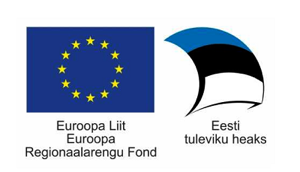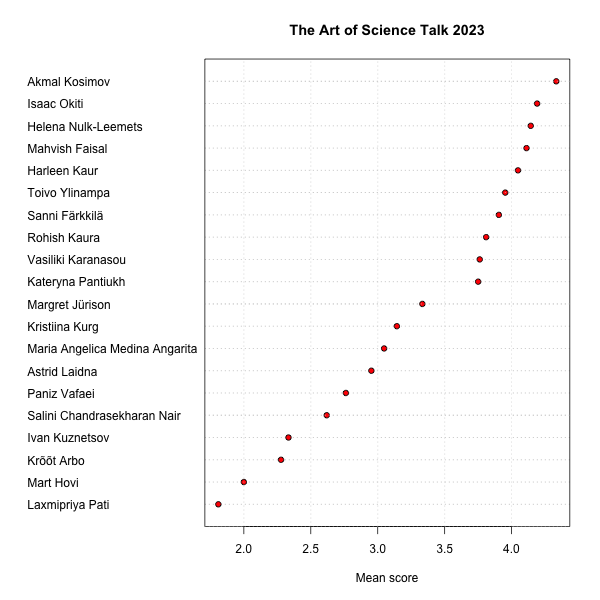Kaheteistkümnes reaalteaduste doktorantide konverents-seminar 19-20 mai 2023 (reede - laup) Tartust väljas, looduskaunis Voore puhkekeskuses.

Eesmärk
... on arendada teaduskommunikatsiooni oskusi, treenida doktorante esitama oma tööd ja eriala reaalteaduste haridusega tavakuulajale:
- Lühidalt
- Köitvalt
- Arusaadavalt
- Atraktiivselt
Kuulajaskonnaks on teised valdkonna doktorandid kõigilt erialadelt ja mõned juhendajad.
2023 ürituse eripära - palun seo oma PhD projekt ettevõttlusega - kuidas panna tulemused maksuraha tootma (või maksuraha säästma). Kui sa ei ole sellele varem mõelnud, siis nüüd mõtle. Miks? Eesti ja EL teadusraha poliitikapendel liigub täiskiirusel ettevõttluskoostöö rüppe.
Suulise ettekande ajalimiit on 10 min (+ piisav aeg küsimusteks ja aruteluks)
Esinejad saavad soovi korral koolituse eest 2 EAP mõne järgneva eest:
PK.1712 Loodusteaduste doktorantide esinemisoskuste koolitus-seminar I (EMÜ)
LOLO.00.064 Loodusteaduste doktorantide esinemisoskuste koolitus-seminar I (TÜ)
LOLO.00.067 Loodusteaduste doktorantide esinemisoskuste koolitus-seminar II (TÜ)
Ettekandele järgneva arutelu fookuses on:
- Kas antud teemat oleks saanud veel paremini esitada
- Kas oli sobival määral näitlejameisterlikkust, kandev hääl, kas sõnades ja intonatsioonis oli veenmisjõudu
- Kas pilk uitas laes, põrandal, arvutiekraanil või oli silmside kuulajatega
- Kehakeel, liikumine
- Kas kõike oli parasjagu, huumorit, teadust, kas ei mindud liiga joviaalseks
- Kuivõrd on esitus, mõttearendused, loogika, lihtsus seeditavad Eesti avalikkusele, kellel ei ole sügavaid erialaseid teadmisi.
Vihjed
Oma doktoritöö teema võib ju tunduda kuitahes igav, aga nüüd tuleb seda esitleda kui maailma kõige põnevamat ja elu edasiviivamat.
Teised doktorandid peavad tundma kadedust -- just seda oleks ma ise teha tahtnud!
Siht on valdkonna doktorantide koostöö arendamine, tulevase teadlaskonna ja ühiskonna ning meedia sidususe suurendamine.
- Väldi sügav-teaduslikke termineid. Kui ei saa, kasuta neid minimaalselt. Mis on liiga teaduslik, mis mitte sõltub auditooriumist. Tunneta auditooriumit.
- Alusta millegi üldinimlikuga, millegagi mis puudutab kõiki kuulajaid. Või enamikku. Pole paha alustada millegi apokalüptilisega.
- See ei ole töörühma seminar! Kuulajale tuleb lühidalt ja kannatlikult selgitada ka oma teema põhitõdesid.
Hea ettekande tunnused:
- Sinu lugu on huvitav, esitatud köitvalt, kuulaja- ja ajasäästlikult.
- Kujutage end liftis kokku juhtumas unelmate tööandjaga. Sul on aega oma mõtted välja öelda, oma ideed maha müüa, kuni lift pärale jõuab.
sa saad töökoha.
Kui tähtede seis soosib, tuleb kohale tipp-koolitaja
Gleb Maltsev.
... kellelt on ka kõige osavamatel õppida.
Glebi stiilinäited
Glebi eriväljaanne doktorantidele, kes oma õpitut rahaks tahavad teha.
12th Training Camp "How to Give a Popular Sciecne Talk" to PhD students in natural sciences will take place on May 19-20 (Fri - Sat). The event will take place at a picturescues Voore guesthouse.

Overall goal
... is to give a short presentation of your PhD project so that people outside your area will comprehend, and feel it's cool. Your talk should be:
- Short and sharp
- Attractive
- Comprehensible
- Convincing to the audience
The audience will be anyone from geography to material science to molecular biology to nuclear physics (and anything in between), and last but not least -- to science journalists.
A special twist for the 2023 event - please link your PhD project to commercialisation. How can your project create tax money (or save tax money). If you have not thought of this before - now you will! Why? Estonian and EU R&D policy moves towards commercialisation and entrepreneurship at full speed. Better buckle up if you have not already.
The talk should not exceed 10 min + there will be sufficient time for feedback and questions.
Those who deliver a talk can get 2 ECTS for one of the following:
PK.1712 Workshop-seminar: how to give a popular science talk I (EULS)
LOLO.00.064 Workshop-seminar: how to give a popular science talk I (UT)
LOLO.00.067 Workshop-seminar: how to give a popular science talk II (UT)
The feedback focuses on:
- Would it have been possible to present the topic better than what you did?
- Were there enough artistic skills? Was the voice clear and loud enough, was there enough convincing power?
- Body language, footwork, hand movements
- Where did you look? Screen? Out of window? Did you turn your back to the audience? Did you have eye contact with the audience?
- Was there enough, but not too much humour and jokes. Was there enough science?
- To what was the presentation, the narrative, the logics, digestible for mere mortals who do not have deep knowledge about the topic?
Some hints to a succesful survivor:
- Try to avoid specific scientific terms. It is not necessarily obvious, what is too specific and what is not. Feel your audience to make a best guess.
- At the very beginning, try to link you topic with something what touches everyone (or most) in the audience. E.g. the link below -- cancer is something that concerns very many of us at old age. Be apocalyptic, if feasible.
- If you loose the attention of the audience at some point, worst, at the beginning of your talk, it is very, very difficult to win them back. (Though, possible)
- This is not at all your working group seminar. Even the basic principles, obvious to yourself, need to be patiently but concisely explained to the audience.
A good presentation should be something like this:
- Your show is interesting, presented attractively, you save time and the audience.
- Think of a lift-talk format. Meeting withe a dream employer. You have a few minutes to tell what you have to tell, sell your story. You reach your floor and you have the job.
As in last year, we probably have the privilege to get there an award-winning pitch trainer
Gleb Maltsev. Even the best can learn from him.
Check this out
Gleb's special issue for PhD students who are looking to commercialize and to learn how to pitch.

